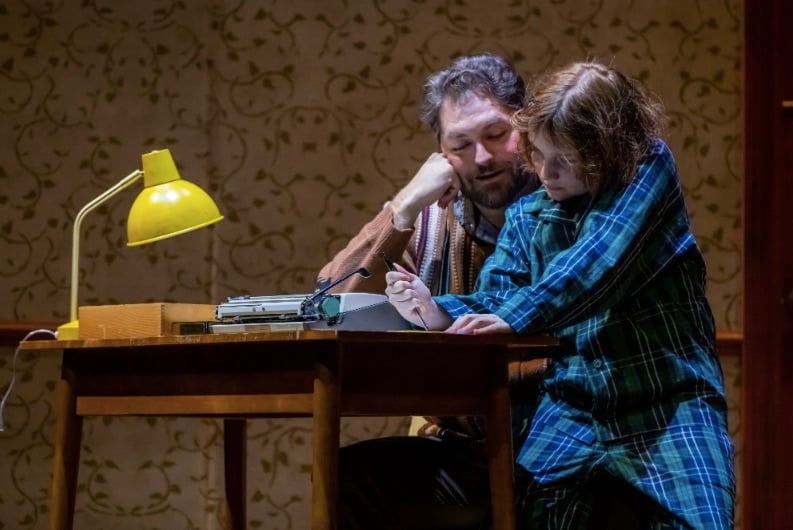Stephen King’s The Shining has enjoyed a long and lustrous afterlife. Published in 1977, the horror novel became a best-seller and, in 1980, was made into one of the finest horror films of all time by director Stanley Kubrick. A TV miniseries followed in 1997.
Now, a 2016 operatic adaptation of The Shining by American composer Paul Moravec has made it to Atlanta, courtesy of The Atlanta Opera and the Alliance Theatre.
It’s a compelling stage work, satisfyingly creepy and occasionally poignant and humorous, and driven by a colorful score, superb vocals and eye-popping high-tech visuals.
The story of the opera, with a libretto by Mark Campbell, follows the novel more closely than the Kubrick film, which King never liked. Jack Torrance, an aspiring writer, is hired as the winter caretaker at the Overlook Hotel, an isolated resort in the Colorado Rockies.

Jack is a recovering alcoholic with anger issues which in the past caused him to accidentally break his son Danny’s arm and lose a teaching job after assaulting a student. Jack and his wife, Wendy, hope the hotel’s seclusion will heal the rift in their marriage and help Jack reconnect with Danny. The boy, incidentally, has a sort of “second sight” or “the shining,” a supernatural skill he shares with the hotel’s cook, Dick Hallorann.
At the beginning of the opera, Wendy repeatedly proclaims the hotel and its surroundings “perfect.” Indeed, what could go wrong? A lot, as it turns out.
The hotel, it seems, has a lurid past, marked by murders, suicides and Mafia hits. As the days wear on, the ghosts that haunt the hotel — both victims and perpetrators of violence — begin to appear in both menacing and ebullient fashion. Plagued by dark visions, Jack is provoked to violence against his family.
King’s novel may seem an odd choice for an opera, which can be slow moving. Opera often stops to reflect, sometimes at great length. A horror film, by contrast, often moves, and sometimes quite quickly.
Yet this opera succeeds, thanks not only to Moravec’s evocative music but Campbell’s deft libretto and David Murakami’s spine-tingling visual projections.
Moravec writes appealing music, clearly modern but also tonal and Romantic. His score swells in a vision of hope at the beginning of the opera, evokes a tense, eerie atmosphere as the ghosts stalk the hotel corridors, and snarls and thunders during the more violent scenes of Act II.
Some of the opera’s finest moments are the sumptuous duets and trios, and especially the full-throated ensemble numbers, with the carnival of ghouls joining together in antic revelry, somewhat evoking campy images of The Rocky Horror Picture Show.

Campbell’s libretto includes much sung dialogue. That gives the narrative an agreeable momentum but it also means that the exposition-heavy Act I offers few traditional arias of the sort that many opera-goers may expect.
In addition, audiences hoping for horror film-like thrills may be disappointed. The opera’s aesthetic hews closer to a menacing Hitchcock-style atmosphere than to the gory predilections of a contemporary slasher film. The opera is often surreal and nightmarish, but only rarely jolting or hair-raising. One is never tempted to watch the proceedings through fingertips.
The opera misses some opportunities. The famous “redrum” motif is introduced but not developed. The murdered Grady girls, surely one of the most marvelously disturbing elements in the novel and film, are seen and heard all-too-briefly. The final scene of the opera is lovely (a lyric aria for Hallorann) but somewhat low-key.
The opening night cast was terrific. (The principal roles have alternating casts.) Craig Irvin brings a robust baritone to the role of Jack; Irvin nimbly negotiates a singing part that clearly carries him up into the stratospheric tenor range. Kelly Kaduce plays Wendy with a radiant soprano. Max Walls, as Danny, is a hugely talented young actor. Kevin Deas sings the role of the kindly cook Hallorann with a warm, resonant bass-baritone.
The rest of the cast is uniformly excellent.
Director Brian Staufenbiel, assisted by Nora Winsler, keeps the proceedings taut and dynamic. Conductor Timothy Myers draws a polished and vigorous performance from the Atlanta Opera Orchestra. Rolando Salazar is responsible for the tight choral preparation.
It takes a village, of course, to create an opera, and the forceful effect of this work is greatly enhanced by the scenic design (Jacquelyn Scott), costumes (Alina Bokovikova), lighting (Jim French and Marcella Barbeau), sound design (Jon Summers), wig and makeup (Melanie Steele) and filmed media (Felipe Barral and Amanda Sachtleben).
This pleasingly macabre production of The Shining continues at the Alliance Theatre through October 1.
A final note: Two more adaptations of King’s novel are in the works: a stage play and a HBO Max spin-off series called Overlook.
The Shining will shine on.
::
Paul Hyde is a longtime arts journalist and English instructor in Upstate South Carolina. He writes frequently for the Greenville Journal in South Carolina and Classical Voice North America.

